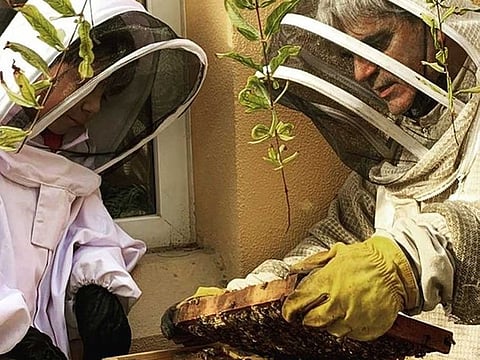How this Frenchman became a busy bee in Dubai
Dubai-based bee farm produces pure and organic honey

“If the bee disappears from the surface of the Earth, man would have no more than four years left to live.” This quote attributed to Albert Einstein resonates today more than ever as the world faces a shortage in honey-making bees. France-native Olivier Cantagrel understands that all too well, and realizes the importance of bees for human beings. “Bees have taken a special place in our life as early as ancient Egypt. There were bees in most homesteads in Europe up until mid-20th century; so, many humans have developed a special relation with the domestic bee Apis mellifera,” says Olivier.
Born and raised in central France, Cantagrel moved to the UAE 15 years ago where he managed telecom companies for over a decade, with no link to nature, agriculture or beekeeping. And yet, today, Olivier is a natural beekeeper who produces pure raw honey and sells bees and beehives to individuals or companies willing to install an apiary on their premises. He also organises fun and educational sessions on bees and beekeeping in the UAE, aiming to increase interest in the subject.
Olivier’s grandparents had countryside estates and farms, so he was introduced to agriculture early on and became interested in growing plants. However, he couldn’t pursue his hobby as he became a traveling expat. A few years ago in Dubai, while driving his daughter to school, he bumped into his neighbour Hussein, fully dressed in beekeeper gear. That definitely sparked his interest. Hussein introduced him to the particularities of beekeeping in the UAE, and they quickly became friends then business partners. That’s how it goes when things are meant to be!
The French beekeeper developed a fascination in the small black and yellow creatures. He describes bees, especially the social bees that live in colonies, as very sensitive animals. Through their extraordinary sensory capabilities, they can hear our heartbeat and discern subtle changes in our odor, allowing them to sense fear or anxiety. So, when approaching bees, “[…] you want to stay calm, open and focused at the same time. In doing so, you will not be categorised by bee guards as a danger, so and will stay gentle,” advises Olivier. Bees actually have an impressive governance system that gives a voice to many before commonly deciding on key issues such as where to establish the colony next or when it is time to replace the aging queen. Some call it a bee democracy. How sweet is that?
Cantagrel founded Olivier’s Bee Farm where he practices natural beekeeping and only produces local, pure raw honey. “Good honey does not come cheap. If it is cheap, it is not good honey,” he explains. We also learned that not all honey products are organic. At his bee farm though, organic is key; no chemical treatments are used and there is no artificial feeding. Only the surplus of honey produced is harvested in order not to push bees to the maximum production volume. Natural re-queening is preferred, relying on natural selection.
They even go beyond organic by practicing natural beekeeping: that is trying to disturb the bees as little as possible so they live a life as similar to the one they would’ve lived in their natural, original forest habitat. Respecting the bees is essential as they have a special place in our life, being an excellent pollinator of all kinds of plants, including ones we have domesticated as our main source of food nowadays. On a more local level, the native Apis florea - commonly known as dwarf bee - was in the region before humans. Those bees live exclusively outside in smaller colonies and have a habit of moving from one place to another to find resources, a phenomenon dubbed ‘swarming’. Although they produce honey in smaller quantities and store less due to their constant migration, Olivier and his team strive to protect the Apis florea that people often wrongly consider as pests. They relocate unwanted bees that landed in someone’s garden or balcony, capture them in a box then release them in suitable gardens, ensuring a much better alternative to the common practices of destroying their nest or killing them with chemicals, which is what many services unfortunately do.
Although the COVID-19 pandemic somehow helped some types of fauna and flora thrive since less humans were disturbing nature, it simultaneously reduced human interaction and affected certain initiatives. In that context, many interesting projects Olivier had set with schools and businesses were delayed in 2020. However, this year he is planning on implementing more apiaries and plant more vegetation for bees to benefit from. The team and Olivier have designed several urban Myawaki Forest projects that include a ‘Bee Garden’ with a ‘Bee School’ for people to learn more about the little busy creatures. A ‘Bee Café’ with delicious recipes all around honey and several indoor beehives for customer to experience live bees from the comfort of their seat might be in the plans for the near future. We’ll surely keep an eye for that!



